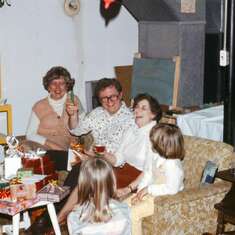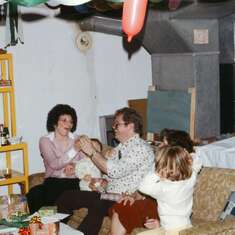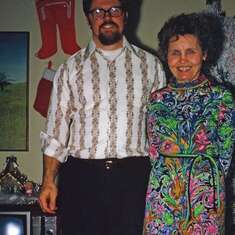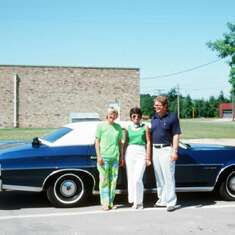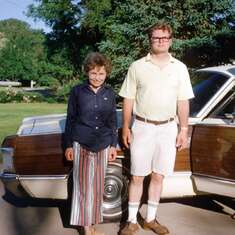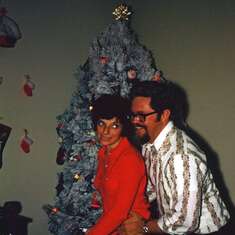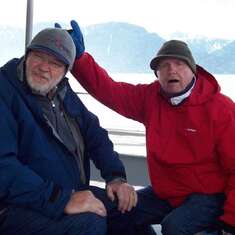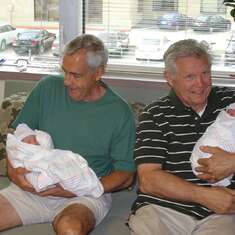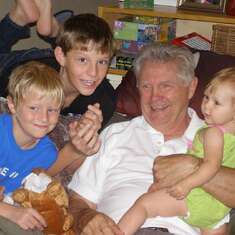StoryCorps Excerpt 2015 - Childhood
April 17
by Mike Perham
Can you tell me a little bit about your childhood? What were you like as a child?
I was very quiet in most situations. I had an older brother who I adored and he would take me around. We would do all kinds of stuff like going swimming in a pool that was made by a contractor who was digging, was getting gravel. This was outside of Chicago area. And the last glacier ended right there and dropped a lot of gravel in a lot of areas. So there was a gravel pit there and it filled up with water when they hit the water table and that was the end of that for them, but it made a wonderful swimming hole for us. So we would go down to the gravel pit and go swimming. I wasn't, my brother was three years older and of course he could, he was physically stronger than I was, but he saved my life down there as we were swimming across the thing. It was large and deep and we were swimming across and I couldn't make it. I was lagging behind and I was making it about 50-60% of the length there but he came back and did the old Boy Scout swimming rescue, and swam me over to the other side, and I went with him. So, he was a very good guy. He was always helping people, and he helped me and I was happy about it. It was different when I was a child. It was in the 1940s.
I was born in 1940, so it was considerably different. Not a lot of people had any real money of any kind, and that didn't worry anybody. Of course, there was a war there going on as well. But our clothing was pretty much like the movie Christmas Story. If you've seen the movie Christmas Story, there's not very many colors in the clothing. And that was exactly how a neighborhood looked and felt, but you don't notice that that's different than what it is today because, of course, it was at the time. So it was a very pleasant childhood. I had a great time.
We would go sledding in the winter. We'd hop rides on cars by holding on to their bumpers in the wintertime. We did all kinds of strange stuff. I actually shot my sister with a BB gun. A little bit rougher time. Yeah, it was a little bit different. But we had a nice time and we had a great childhood.
One of the better ones was, of course, as children, you're always interested in doing things adult, so my brother somehow got some cigarettes and we were, oh, that's Father Parker's. He's throwing something down the stairs. Yeah. And he had got a couple of cigarettes someplace, and of course, I must have been about eight years old. So we were out in the back of the garage and we lit up a cigarette. And our mother found us out there, probably wondering where the heck the smoke was coming from. So she was a Finnish woman, very straightforward. So she went out and bought a cigar, and she made us smoke half of it, one half each, hoping to impress us that we would get a little sick from that. I was the only one that did. My brother said, oh, I'll smoke the first half.
So we sat on the cellar stairs while she was doing a wash down there. And so he smoked the first half of the cigar. Well, he had a lot more experience than I did, knowing that the second half of the cigar is very strong. So I was very dizzy and upset when I left the cellar and I met my brother outside. He was just happy. That was great. He got a free smoke. So it was all like that.
And my grandparents lived up in Minnesota. We only had a grandmother on my mother's side at that point, and well, she did marry another man. Our grandfather died in like 1927 in a mine, in a taconite mine, which is crude. They were able to be able to handle taconite and make it useful in terms of making a profit. So there were taconite mines as well as iron ore mines. And he got killed in a rock slide in the mine.
And she later married in the very early 40s. And I never knew her. I only saw her a couple of times up in Minnesota. But I was just a very small kid. You know, I mean, I was no older than two. And I'm crawling around the house. I guess that was the wedding day. And I'm crawling around there, but you can't understand anybody because everything was in Finnish. And that's a very strange language. It's quite different. It's related to Magyar. And really different. Tongue action and whatever.
So I had met her there, but the thing that always struck me as being somewhat funny is that the jokes about Norwegians and Finns up in Minnesota, there's special jokes about them.
And like Ole—well, his name was Ole. Ole and Lena were the famous ones. Ole was not very bright and Lena was cool. But this guy's name was Ole and he was a nice guy. I met them one other time.
And then she died of cancer, so we only had one grandparent on my father's side up in a place called Wolf, Minnesota, which is a county, I believe up in northern Minnesota, about 50 miles from the border.
I was very quiet in most situations. I had an older brother who I adored and he would take me around. We would do all kinds of stuff like going swimming in a pool that was made by a contractor who was digging, was getting gravel. This was outside of Chicago area. And the last glacier ended right there and dropped a lot of gravel in a lot of areas. So there was a gravel pit there and it filled up with water when they hit the water table and that was the end of that for them, but it made a wonderful swimming hole for us. So we would go down to the gravel pit and go swimming. I wasn't, my brother was three years older and of course he could, he was physically stronger than I was, but he saved my life down there as we were swimming across the thing. It was large and deep and we were swimming across and I couldn't make it. I was lagging behind and I was making it about 50-60% of the length there but he came back and did the old Boy Scout swimming rescue, and swam me over to the other side, and I went with him. So, he was a very good guy. He was always helping people, and he helped me and I was happy about it. It was different when I was a child. It was in the 1940s.
I was born in 1940, so it was considerably different. Not a lot of people had any real money of any kind, and that didn't worry anybody. Of course, there was a war there going on as well. But our clothing was pretty much like the movie Christmas Story. If you've seen the movie Christmas Story, there's not very many colors in the clothing. And that was exactly how a neighborhood looked and felt, but you don't notice that that's different than what it is today because, of course, it was at the time. So it was a very pleasant childhood. I had a great time.
We would go sledding in the winter. We'd hop rides on cars by holding on to their bumpers in the wintertime. We did all kinds of strange stuff. I actually shot my sister with a BB gun. A little bit rougher time. Yeah, it was a little bit different. But we had a nice time and we had a great childhood.
One of the better ones was, of course, as children, you're always interested in doing things adult, so my brother somehow got some cigarettes and we were, oh, that's Father Parker's. He's throwing something down the stairs. Yeah. And he had got a couple of cigarettes someplace, and of course, I must have been about eight years old. So we were out in the back of the garage and we lit up a cigarette. And our mother found us out there, probably wondering where the heck the smoke was coming from. So she was a Finnish woman, very straightforward. So she went out and bought a cigar, and she made us smoke half of it, one half each, hoping to impress us that we would get a little sick from that. I was the only one that did. My brother said, oh, I'll smoke the first half.
So we sat on the cellar stairs while she was doing a wash down there. And so he smoked the first half of the cigar. Well, he had a lot more experience than I did, knowing that the second half of the cigar is very strong. So I was very dizzy and upset when I left the cellar and I met my brother outside. He was just happy. That was great. He got a free smoke. So it was all like that.
And my grandparents lived up in Minnesota. We only had a grandmother on my mother's side at that point, and well, she did marry another man. Our grandfather died in like 1927 in a mine, in a taconite mine, which is crude. They were able to be able to handle taconite and make it useful in terms of making a profit. So there were taconite mines as well as iron ore mines. And he got killed in a rock slide in the mine.
And she later married in the very early 40s. And I never knew her. I only saw her a couple of times up in Minnesota. But I was just a very small kid. You know, I mean, I was no older than two. And I'm crawling around the house. I guess that was the wedding day. And I'm crawling around there, but you can't understand anybody because everything was in Finnish. And that's a very strange language. It's quite different. It's related to Magyar. And really different. Tongue action and whatever.
So I had met her there, but the thing that always struck me as being somewhat funny is that the jokes about Norwegians and Finns up in Minnesota, there's special jokes about them.
And like Ole—well, his name was Ole. Ole and Lena were the famous ones. Ole was not very bright and Lena was cool. But this guy's name was Ole and he was a nice guy. I met them one other time.
And then she died of cancer, so we only had one grandparent on my father's side up in a place called Wolf, Minnesota, which is a county, I believe up in northern Minnesota, about 50 miles from the border.


